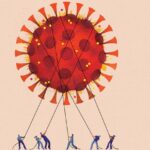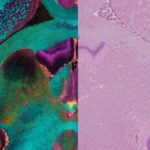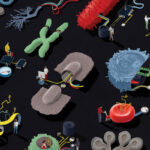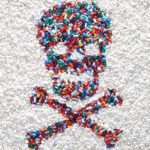Author
Taking a proactive approach
Mar. 5, 2025—Vanderbilt University Medical Center has joined an extraordinary national effort to develop and stockpile new vaccines and antibody therapies against a host of viral threats to prevent another pandemic. Pending the availability of funds, the National Institute of Allergy and Infectious Diseases of the National Institutes of Health expects to commit approximately $100 million annually...
How Fast Can He Run
Mar. 4, 2025—Six-year-old José Capablanca was excited to see his visitors. “I think you guys want to know how fast I can run!” he shouted, as he gleefully raced around the living room and kitchen of his family’s home in Gallatin, Tennessee. José has Duchenne muscular dystrophy (DMD), a rare genetic disorder that affects mainly boys, and...
The Obstacle is the Way
Mar. 3, 2025—In late June 2024 James Crowe Jr., MD, began a grueling, seven-day, 155-mile ultramarathon through the Gobi Desert of Central Mongolia. It was one of several physical challenges undertaken that year by Crowe, 63, whose lab at Vanderbilt University Medical Center has attracted international attention for developing monoclonal antibodies against a host of viral diseases,...
Innovations improve the lives of patients with IBD
Mar. 27, 2024—Two recent innovations — point-of-care intestinal ultrasound and functional medicine — are improving the lives of patients at the Vanderbilt Inflammatory Bowel Disease (IBD) Clinic. Characterized by chronic inflammation of the gastrointestinal tract, IBD is a group of disorders that includes Crohn’s disease and ulcerative colitis. Upper endoscopy and colonoscopy are used to diagnose IBD,...
Lower blood pressure simply by reducing salt intake, study suggests
Mar. 27, 2024—Nearly everyone can lower their blood pressure, even people currently on blood pressure-reducing drugs, by lowering their sodium intake, reports a new study from Vanderbilt University Medical Center, Northwestern Medicine and the University of Alabama at Birmingham. “In the study, middle-aged to elderly participants reduced their salt intake by about one teaspoon a day compared...
Chronically disrupted sleep may increase risk for heart disease
Jul. 19, 2023—Sleep irregularity — chronically disrupted sleep and highly variable sleep durations night after night — may increase the risk for atherosclerosis, according to a study led by Kelsie Full, PhD, MPH, of Vanderbilt University Medical Center. The multicenter study, reported Feb. 15 in the Journal of the American Heart Association, followed 2,032 participants from six...
The critical role of research volunteers
Jul. 18, 2023—In 1998, Melissa Sparks, a 35-year-old single mother of two young daughters from rural Dickson County, Tennessee, developed a headache so excruciating it dropped her to her knees. Her mother rushed her to the nearest hospital, but by the time they arrived, Sparks was unconscious. When she awoke, she couldn’t remember what day it was....
Drug Repurposing Goes International
Jul. 18, 2023—In 2020, VUMC joined forces with the Aurum Institute, a nonprofit, public benefit organization based in Johannesburg, South Africa, to find new uses for existing drugs on the World Health Organization List of Essential Medicines. The collaboration, called Project Remedi, or Repurposing Essential Medicines Internationally, has proposed the use of the antioxidant N-acetyl cysteine in acute liver...
Old drugs, new uses
Jul. 18, 2023—The odds of bringing a new, safe and effective drug to market are very low. Even for drug candidates that make it to human testing in clinical trials, 90% ultimately fail, often because they cause unexpected and serious side effects. The gauntlet of testing has thwarted so many promising therapies that it has been dubbed...
Endangered Species
Jan. 4, 2023—Two thousand fifty years ago, the Roman poet Horace spun a phrase that never seems to lose its power: Carpe diem. Seize the day. The line continues: Put very little trust in tomorrow. By that Horace meant, don’t leave the future to chance. Act now. Make tomorrow better. Carpe diem is a worthy mantra for...
Clinical Innovators
Jan. 3, 2023—Several years ago, Adam Hetzler was working at the Sandia National Laboratories in Albuquerque, New Mexico, when he decided to do something completely different with his life. “I loved the people I worked with, and I thoroughly enjoyed the work,” he said, “but I wanted to make a more tangible difference in people’s day-to-day lives.”...
Investment in Undergraduates
Jan. 3, 2023— “I got to be there and see it in person,” says Melanie Perez, a senior at Florida International University, describing her experience in the 2022 Medical Scientist Training Program (MSTP) Summer Research Program at Vanderbilt University School of Medicine. The nine-week program for college undergraduates interested in the MD/PhD career track is an extension...
National recognition for STEM pipeline program
Jan. 3, 2023—The Aspirnaut STEM pipeline at Vanderbilt University Medical Center celebrated its 15th anniversary with a daylong scientific symposium, followed by a feature on the program broadcast Aug. 2 on “NBC Nightly News.” The pipeline is designed primarily for under-resourced and under-represented rural high school and undergraduate students. Dressed in white lab coats, 20 participants in...
When Words Fail
May. 16, 2022—In the 2010 film, “The King’s Speech,” a speech therapist helps the king of England overcome a significant stutter so that he can address the nation at the outbreak of World War II. If only it were that straightforward. For those who stutter, and there are millions of people of all races and cultures, the...
What the Pandemic is Teaching Us
Oct. 18, 2021—It’s too soon to call an end to COVID-19, the worst worldwide pandemic in 100 years, which has killed as many Americans as the 1918-19 flu. The slow uptake of effective vaccines has enabled the causative virus, SARS-CoV-2, to continue to evolve in dangerous and easily transmissible ways. But it’s not too early for health care...
The Race to Rein in Renegade RNA
Oct. 5, 2020—How is it that an encapsulated, single strand of genetic material called SARS-CoV-2 can cause so much havoc? By the middle of September, nine months after an outbreak of viral pneumonia was first reported by health authorities in Wuhan, China, the RNA virus that causes COVID-19 had infected more than 29 million people worldwide and killed...
The Potential of Plasma and Passive Immunity
Oct. 5, 2020—In August VUMC was awarded a one-year, $34 million grant by the National Center for Advancing Translational Sciences (NCATS), part of the National Institutes of Health, to conduct a nationwide study of “convalescent plasma” as a treatment for COVID-19. The study, called the Passive Immunity Trial for Our Nation (PassItOn), will test whether infusions of...
Hydroxychloroquine: Ineffective as a therapy, can it help protect health care workers?
Oct. 5, 2020—In addition to remdesivir, several other drugs are being tested for the treatment of COVID-19. One of them is hydroxychloroquine (HCQ), a drug originally developed to treat malaria but which currently is prescribed as an anti-inflammatory medication to reduce the pain and swelling of rheumatoid arthritis and systemic lupus erythematosus (lupus). In laboratory studies HCQ...
Alumni Profile: Jessi Solomon Sanders, MD
Sep. 13, 2018— A Champion for Children Jessi Solomon Sanders, MD, has an affinity for children with chronic illnesses and special needs that began in childhood and helped shape her future as a resident physician in neurodevelopmental disabilities at Boston Children’s Hospital. She grew up in Cleveland, Ohio, and accompanied her mother, an advocate for children with...
Alumni Profile: Sharat Kusuma, MD
Sep. 13, 2018— Medical Visionary Sharat Kusuma, MD, MBA’02, BA’97, grew up in Albany, Georgia, and comes from a family of doctors. His father is a gastroenterologist, and his brother is a Vanderbilt-trained plastic surgeon. Kusuma chose orthopaedic joint replacement surgery as his clinical specialty. “The way you can immediately affect the gait and mobility of patients...
Up Close and Personal
Mar. 1, 2018— Recent advances in imaging technology are enabling scientists to “see” how molecules, cells and tissues are put together — and work together. These unprecedented views of life down to the minutest level are yielding radical new insights into the causes, treatment and prevention of disease. At Vanderbilt University and Vanderbilt University Medical Center (VUMC),...
Next-Generation Vaccines
Sep. 22, 2017—The Human Immunome Program is one of two initiatives currently being pursued by the Human Vaccines Project (the Project). The other initiative, called the Rules of Immunogenicity Program, aims to elucidate the key principles of human immunology to understand how to generate life-long protective immunity. The ultimate mission is to accelerate development of “next-generation” vaccines...
Cracking the Code of the Immune System
Sep. 22, 2017— Of all the threats that face humankind, microbial invaders are among the most frightening. They can overwhelm the body’s immune defenses in a matter of hours. Modern medicine is often powerless against them. And new emerging infections are raising their ugly heads all the time. At Vanderbilt University Medical Center (VUMC), an elite unit...
Immunity, Infection, Inflammation focus of New Research Institute
Sep. 22, 2017—Vanderbilt University Medical Center (VUMC) is launching a new institute to coordinate initiatives among the rapidly evolving disciplines of infection biology, immunology and inflammatory diseases. The Vanderbilt Institute for Infection, Immunology and Inflammation — VI4 for short — will be headquartered in facilities at the Medical Center and will serve the entire Vanderbilt community. The...
The Impact on Babies
Mar. 7, 2017—There’s been a disproportionately greater increase in opioid use among pregnant women in rural versus urban counties, according to a December 2016 study in the journal JAMA Pediatrics. The study, authored by Stephen Patrick, M.D., a neonatologist at the Monroe Carell Jr. Children’s Hospital at Vanderbilt, and colleagues from across the country, focused on data...
Hooked
Mar. 6, 2017—The epidemic of opioid abuse, which each day claims the lives of 91 Americans and adds billions annually to the nation’s health care bill, can be stopped—but it’s not going to be easy, say those steering the ship at Vanderbilt University Medical Center (VUMC). “It took us a while to get here, and it’ll take...
Buprenorphine used to shape behavior for those in recovery
Mar. 6, 2017—Charles* is one of the lucky ones. Three decades after he first sneaked his little brother’s hydrocodone cough medicine, 20 years after he started dissolving morphine pills in a heated spoon and injecting the milky solution into his veins, Charles has found his way back to what he calls a “normal” life. He didn’t die...
VUMC to receive $71.6 million from NIH for Precision Medicine Initiative Cohort Program
Aug. 22, 2016—In July the National Institutes of Health (NIH) announced it will provide $71.6 million over five years to VUMC to establish and operate the Data and Research Support Center for the Precision Medicine Initiative (PMI) Cohort Program, making this the largest research grant the Medical Center has ever received from any source. “We are honored...
Giving in Action: Janet and Jim Ayers
Feb. 23, 2016—In 2005, Tennessee philanthropists Jim and Janet Ayers gave $10 million to help Vanderbilt University scientists find early markers for colorectal cancer that could improve diagnosis and potentially save lives. Within nine years, the gift, which established the Jim Ayers Institute for Precancer Detection and Diagnosis at Vanderbilt-Ingram Cancer Center (VICC), had yielded an impressive...
Bitter Pill
Feb. 22, 2016—On the evening of June 12, 2015, Donna Emley took two acetaminophen (Tylenol) for a slight muscle ache and went to bed. The next day, she and her husband drove to Kentucky, where they were planning to spend a week at an organic farm. She awoke at 2 a.m. the following day and noticed that...
Study sheds light on side effects of COX-2 drugs
Feb. 22, 2016—It’s been about a decade since the promise of COX-2 inhibitors—drugs that relieve arthritis pain and inflammation without the gastrointestinal side effects of other painkillers—was tempered by the realization that they could cause heart problems in some patients. Now a team of Vanderbilt University Medical Center scientists led by Ming-Zhi Zhang M.D., M.Sc., and Raymond...
Major grant to transform region’s clinical practices
Feb. 22, 2016—Vanderbilt University has received a contract from the Centers for Medicare and Medicaid Services (CMS) for up to $28 million over four years to help more than 4,000 clinicians in the Southeast transform their clinical practices in ways that improve quality of patient care and hold down costs. The contract is part of the Transforming...
Hope Amid a Continuing Crisis
Aug. 21, 2015—It’s been 20 years since her doctor silently handed Katrina Robertson a lab report that showed she was infected with human immunodeficiency virus (HIV). Yet the memory is still painfully fresh. “I remember just boo-hooing and crying because it was like I’m gonna die,” said the 47-year-old native Nashvillian. “Everybody I’d heard about … it...
Study: Balanced high-fat diet improves body composition, inflammation
Feb. 10, 2015—A diet designed for weight loss not only helps people shed unwanted pounds and keep them off, it also may reduce the risk of heart disease, diabetes and other degenerative conditions, in part by “turning down the heat” of chronic inflammation generated by excess adipose tissue (fat). Surprisingly, it may not be necessary to avoid...
The Good, The Bad and the Ugly of Inflammation
Feb. 10, 2015—It’s a scourge of modern life, each year gobbling up billions of health care dollars in the United States alone. When it’s good, it fights off foreign invaders, heals injuries and mops up debris. But when it’s bad, inflammation ignites a long list of disorders: arthritis, asthma, atherosclerosis, blindness, cancer, diabetes and, quite possibly, autism...
Alumni profile: Oscar Crofford, M.D.
Sep. 5, 2014—A Distinguished Career Oscar Crofford, M.D., is the recipient of the 2014 VUSM Distinguished Alumnus Award, and will be recognized during Reunion Weekend in October. Among his many achievements, Crofford led a landmark study called the Diabetes Control and Complications Trial (DCCT) that established the value of rigorous blood glucose control and revolutionized the treatment...














